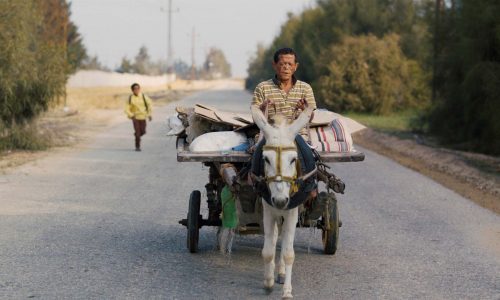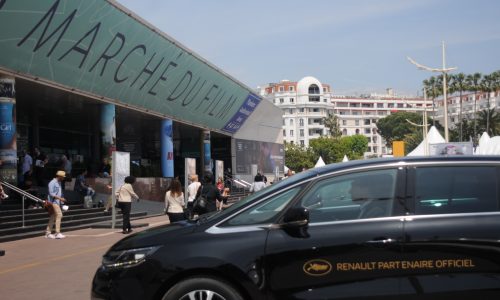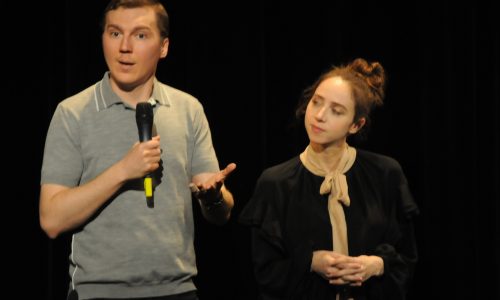I’d forgotten how tough Cannes is, being out late, staying up even later to file contemporaneous articles and then waking up early enough to get back to the Palais for the 8.30am screening. And people think it’s a holiday.

This morning’s early film was the competition entry from Russia’s Kirill Serebrennikov, empty-seated at his own press conference, because criminal charges against him back home mean that he’s not allowed to leave the country. His film, Leto, or Summer, is based on the memoirs of a real-life groupie Natalia Razlogova – if that’s not demeaning her – who had concurrent relationships with two contemporary early 1980s Soviet rock stars, Mike Naumenko and Viktor Tsoi. The free-spirited film – black and white apart from a handful of bursts of red for effect – is almost entirely told through songs – either the singers’ own music or rock classics from the 1970s.
It turns out to be an oddly heart-warming, interesting insight into the Soviet rock scene, a thriving industry in its own right, almost completely unseen – and unheard – in the West. It’s more of a sequence of happenings than a coherent narrative, but as a love-letter to classic rock music, it hits the nail on the head, but there’s not really much to it in terms of revealing much about Soviet society at the time or presenting much drama – even when Natascha, as she’s nick-named, starts being unfaithful. The most drama came from captions at the end, highlighting, without explanation, the short life-spans of both singers.

The next film I went to see on a recommendation. I certainly hadn’t been drawn to Egyptian director AB Shawky’s debut feature Yomeddine, or Judgement Day, from its synopsis – a cured leper, prompted by the death of his wife, decides to leave his leper colony for the first time in his life to travel across Egypt to trace the family who’d abandoned him there. But the warmth and humour of the two lead performances – from Rady Gamal as the former leper Beshay and Ahmed Abdelhafiz as the young orphan nick-named Obama, who joins him on his trek – are heart-breakingly real and will enrich the soul of anyone who cares to follow them on their shared journey of self-discovery. Another official competition entry, this is the kind of unexpected gem which makes film festivals such as Cannes such a delightful treasure trove and makes me feel just a little bit sorry for the majority of the film-going public who – even if they get the chance to see this triumphant tale of two outcasts, probably won’t.

Next, it was time to step away from the festival to visit the film market, that runs alongside it – or more accurately, beneath and behind it. Deep in the bowels of the Palais complex and in the Riviera exhibition centre backing onto the old port behind it is the Marche, a network of stands where sales agents, international film commissions and other industry bodies are selling themselves – or their wares. I bumped into John Adams from the UK sales agent Evolutionary Films, who – in the past year – has released a film he’s directed as well as working with the Department for International Trade in delegations to promote the British film industry abroad. Another part of the market is what’s known as the Village International, a string of pavilions or marquees, lining the beach opposite the Riviera. These generally represent national bodies promoting their countries, the facilities they can offer and the productions they’ve completed. The UK Film Centre, for example, has some of the most recent British films plastered across its walls, such as Mike Leigh’s upcoming Peterloo, which had been touted as a Cannes contender, as well as Solo – the latest Star Wars film, which will receive its world premiere here on the Croisette next week – a film which, arguably, could stretch the definition of what it means to be British.
But in exactly the same way that the UK Film Centre was boldly boasting about some of its upcoming films, Ukraine’s State Film Agency seemed to be missing a trick. With the film Donbass opening the Un Certain Regard strand yesterday, one might have expected the walls of its small showroom to be plastered with its posters, but no – there was not a sign of the film even existing. I popped in to ask why that might be. Perhaps the official state body had not actually been involved in the film? But no, the agency’s Artem Golosov confirmed to me that it had funded the film and suggested that its absence from all posters and promotional post-cards might simply have been down to the tight schedule the production had been on to finish it in time to premiere at Cannes.

Now, the highest profile strand of the Cannes Film Festival is its Official Competition, closely followed by its Un Certain Regard sidebar. But there are a number of other programmes running alongside these selections, each programmed by a different body. In previous years, I’ve popped up the Croisette to watch films featuring in Directors’ Fortnight, but today’s third film was my first ever at Critics’ Week. The actor Paul Dano had jumped behind the camera to direct a screenplay, co-written with his Ruby Sparks co-star Zoe Kazan and his drama about marital infidelity, Wildlife, was the strand’s opening film. The pair were on hand to introduce the film. Dano said he was honoured that his directorial debut was featuring at Cannes, having always spoken of the importance of the festival to promote the kind of films that often don’t otherwise get seen. Kazan went so far as to say that having his film opening Critics Week was a dream come true. The film stars Carey Mulligan and Jake Gyllenhaal as a married couple whose relationship breaks down when he loses his job and, against her wishes, decides to work out of town for a while. The film is, largely, told from the point of view of their fourteen year old son, played confidently by an upcoming young Australian actor, Ed Oxenbould. It’s perfectly well told, but the real cause of their romantic difficulties isn’t tremendously convincing and there’s not really that much in it that expands our understanding of relationships, job-hunting or parenting. It does make a change, though, to see Mulligan in such a selfish, nihilistic and badly-behaved role.
From here, it was time to return to the apartment to freshen up before heading to a couple of parties. The first, staged at a flashy mansion in the hills above Cannes and accessible only by a shuttle-bus, was one of the hot tickets of the night, hosted by representatives from China’s increasingly influential film industry. This, surely, provided them with the opportunity to fill the guests with the finest Chinese food on the Riviera. Or so you’d think – they seemed to have missed a trick, although starting the party at 10pm might have been a clue to guests that they should not expect food – as there was none – not for the first hour, at least, by which time – starving from a day of screenings – it was back into a shuttle-bus to head to the second event of the night.

This year’s HP reception was a little different from previous years. As one of the main sponsors of Cannes, the computing giant usually invites guests from all corners of the industry and the world to its temporary home at the prestigious Hotel Majestic, where it shows off new technology of varying significance to the film industry. But this year, it had opted for one of the beachside clubs with less promotional wares on display. While most of the guests feasted on finger-food and danced the night away, there were HP staff wandering around with mobile phones and mini-printers, comparable in size to the phones, taking photos of guests and printing them out hard copies – yes, children, it is possible to get hard copies of photos. This party was also a little chance for HP to boast – it’s recently got into film production, co-financing and providing technology for the Indian film Manto, about a pioneering male feminist in 1930s India. The company was particularly proud that its first foray into the production side of the industry had resulted in inclusion in the Un Certain Regard programme. And showing off some more of its technology, in the corner of the party, HP was offering a virtual reality tour of the set of the film – there was something just a little incongruous about a 360 degree tour of the set of a gritty Indian drama, with deafening dance music ringing in your ears. With a particularly broad-ranging guest list, this was a reception where I bumped into a number of people I knew, including fellow UK journalists, a South African journalist I meet once a year in Cannes – usually scrabbling for a good seat at the press conferences and the best man from the wedding where I met my other half. As you do.
